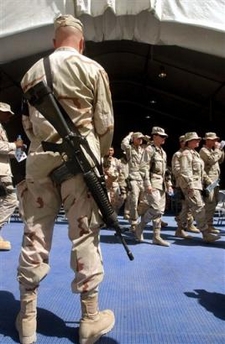|
U.S. tightens Afghan prison security
(AP)
Updated: 2005-11-02 19:43
Security has been tightened at the U.S. military prison
in Afghanistan following the escape of a suspected al-Qaida leader, a U.S.
official said Wednesday, as Indonesian terror officials accused Washington of
failing to inform them of the breakout.

A U.S soldier stands as others get out of a
huge tent at the U.S airbase of Bagram in the north Kabul, Afghanistan on
Sept. 10, 2005. Security has been tightened at a massive U.S. military
detention facility in Afghanistan, a U.S. official said Wednesday, Nov. 2,
2005 after it was revealed that one of four men who escaped from a prison
in July used to be an al-Qaida leader in Southeast Asia.
[AP] | Omar al-Farouq, born in Kuwait to Iraqi
parents, was considered one of Osama bin Laden's top lieutenants in Southeast
Asia until Indonesian authorities captured him in 2002 and turned him over to
the United States.
He was one of four suspected Arab terrorists to escape in July from the
detention facility at Bagram, the main U.S. base in Afghanistan. It was not
clear how long he had been held in Afghanistan.
Although the escape was widely reported at the time, al-Farouq was identified
by an alias and the U.S. military only confirmed Tuesday that he was among those
who fled.
A video the four men made of themselves after they escaped from Bagram was
broadcast recently on Dubai-based television station Al-Arabiya, according to
its Islamabad bureau chief, Bakar Atyani. He declined to give other details,
including how the station received the video.
An Indonesian anti-terror official, Maj. Gen. Ansyaad Mbai, on Wednesday
sharply criticized the U.S. government for failing to inform him that al-Farouq
was no longer behind bars.
"We know nothing about the escape of Omar al-Farouq," he said. "He is a
dangerous terrorist for us, his escape will increase the threat of terrorism in
Indonesia.
"We need to coordinate security here as soon as possible to anticipate his
return," he said. "The escape of al-Farouq could bring fresh wind to the
operation of terrorism and could energize the new movement of terrorist actors
in Southeast Asia and the world."
But a top security consultant in Jakarta played down concerns that al-Farouq
would make his way back to Southeast Asia and rejoin Jemaah Islamiyah, the
regional terrorist group linked to al-Qaida.
"He's Iraqi after all. If he's not hiding out (in Afghanistan or Pakistan),
he's probably headed to Iraq to join the fight there," said Ken Conboy, who
recently published a book on Jemaah Islamiyah.
Al-Farouq was recruited into al-Qaida in the early 1990s and went to the
Khaldan training camp in Afghanistan from 1992 and 1995, Conboy wrote in his
book "Intel."
|